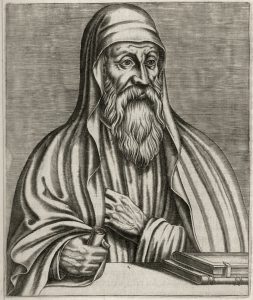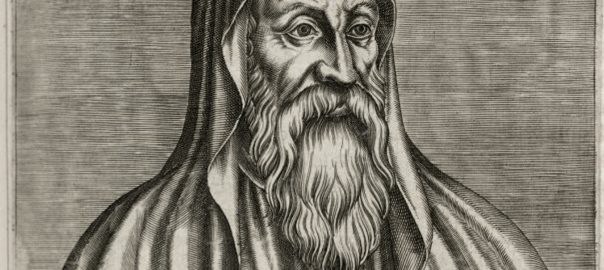
It might come as a surprise to some, that the doctrine of universal restitution or “apokatastasis”, let alone the belief that all human beings will be saved eventually, has never as such been condemned by any of the ancient ecumical church councils. Sometimes, however, it is claimed that the doctrine was condemned at the fifth ecumenical council at Constantinople in 553.
Also read: Apocatastasis: The Heresy that Never Was
So was the Christian doctrine of Apokatastasis condemned at the fifth ecumenical council in 553? No, only in a particular, speculative version of Origen’s teaching. In an article on Origen, Orthodox theologian David Bentley Hart writes:
“It is true that something remembered by tradition as “Origenism” was condemned by someone in the sixth century, and that Origen was maligned as a heretic in the process; and it is also true that for well more than a millennium both those decisions were associated with the Council of 553 by what was simply accepted as the official record. But, embarrassingly, we now know, and have known for quite some time, that the record was falsified. And this is a considerable problem not only for Orthodoxy, but for the Catholic Church as well, inasmuch as the authority of the ecumenical councils must in some way be intimately—if obscurely—bound to some notion of the indefectibility of the Church’s transmission of the faith. (And, frankly, the prejudices of ecclesial fundamentalists are as impervious to historical fact as are the naivetes of young-earth creationists to science.)” (Hart, “Saint Origen” in First Things 2015)
In her monumental scholarly work on the doctrine of Apokatastasis, Ilaria Ramelli writes:
“The Council that is usually cited as that which ‘condemend Origen’ is the fifth ecumenical council, the second Constantinopolitan Council, in 553 CE. First of all, its ecumenicity is in fact doubtful, since it was wanted by Justinian and not by Vigilius, the bishop of Rome, or other bishops; Vigilius was even brought to Constantinople by force, by the emperor’s order, and moreover he did not accept to declare that the council was open (Justinian had to do so). The anathemas, fifteen in number, were already prepared before the opening of the council. Here, Origen is considered to be the inspirer of the so-called Isochristoi. This was the position of the Sabaite opponents of Origen, summarized by Cyril of Scythopolis who maintained that the Council issued a definitive anathema against Origen, Theodore, Evagrius, and Didymus concerning the preexistence of souls and apokatastasis, thus ratifying Sabas’ position (V. Sab. 90). One of these previously formulated anathemas, which only waited to be ratified by the Council, was against the apokatastasis doctrine: ‘If anyone supports the monstrous doctrine of apokatastasis [τὴν τερατώδη ἀποκατάστασιν], be it anathema.’ Other anathemas concern the ‘pre-existence of souls,’ their union with bodies only after their fall, and the denial of the resurrection of the body. These doctrines have nothing to do with Origen; in fact, Origen is not the object of any authentic anathema. And Vigilius’s documents, which were finally emanated by a council that was not wanted by him, most remarkably do not even contain Origen’s name. Origen was never formally condemned by any Christian ecumenical council. [G.L.] Prestige once observed, inspiredly, that ‘Origen is the greatest of that happily small company of saints who, having lived and died in grace, suffered sentence of expulsion from the Church on earth after they had already entered into the joy of their Lord.’ We may add that Origen, strictly speaking, did not even suffer any formal expulsion from the church. One problem is that later Christian authors considered the aforementioned anathemas as referring to Origen; so, extraneous theories were ascribed to him. The condemnations were also ascribed to Didymus and Evagrius; indeed, the Isochristoi professed a radical form of Evagrianism and some anathemas seem to reflect some of Evagrius’s Kaphalaia Gnostica, but it would be inaccurate to refer all of Justinian’s accusations and of the Council’s ‘condemnations’ to Evagrius.
What is notable, these condemnations, however, were never connected with Nyssen, not even that concerning universal apokatastasis. There may be various explanations to this. One is that Nyssen, the theologian who inspired the Constantinople theology in 381 CE, enjoyed too high an authority to be criticized. Also, his ideas could by then be related – and indeed were related – to the Purgatory theory. And his manuscripts bristle with interpolations and glosses concerned with explaining that Gregory in fact did not support the theory of apokatastasis. Germanus of Constantinople, in the eighth century, even claimed that Gregory’s works were interpolated by heretics who ascribed Origen’s ideas to Gregory.
But precisely from the time of Justinian an important confirmation of the presence of the doctrine in Gregory’s and the other Cappadocians’ writings is given in Barsanuphius’s Letter 604. A monk has asked him how it is that Origen’s doctrine, especially that of apokatastasis, was supported by orthodox authors, and even saints, such as the Cappadocians. Barsanuphius, far from trying to deny that the Cappadocians supported the doctrine of apokatastasis, simply observes that even saints can have a limited understanding of the mysteries of God and can be wrong. Therefore, neither the monk nor Barsanuphius, who heartily detested the doctrine of apokatastasis, thought that Gregory did not actually believe in apokatastasis and that his works were interpolated by heretics. (pp. 736-738)”
(Ilaria Ramelli, The Christian Doctrine of Apokatastasis: A Critical Assessment from the New Testament to Eriugena)
